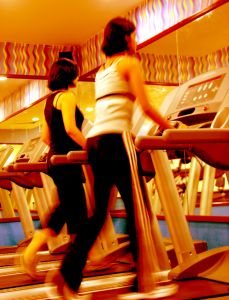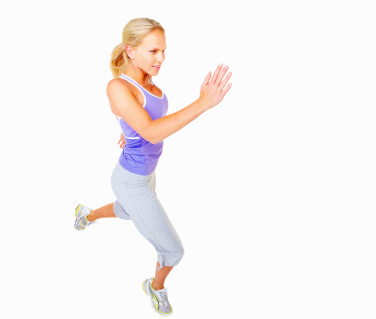Running for Fitness - How Should You Run? How Much Should You Run?
When you are trying to start with running, you are most likely going to have a lot of questions.
I'll try to address some of these questions here. And will provide some (hopefully!) useful links for you as well to answer the other questions.
So, let's get right into it!
Does Running Really Help My Fitness?

And a stronger heart helps in many different ways. It helps make you calmer. It helps you sleep better. It even helps reduce your stress levels. Oh, and let's not forget you reduce your chances of all kinds of terrible diseases!
There are many important benefits of running and improved fitness levels is just one of many!
How Much Should I Run as a Minimum to Boost My Fitness?
Let's start off by saying that something is better than nothing.
Always.
Don't get caught in a trap where you won't do any exercise because you don't have much time to improve.

That can be running, walking, cycling, etc. But do enough activity during a week that raises your heart rate.
When you want to achieve some running goals, the minimum I recommend is to run at least three times per week.
When you come from a low base of fitness, that's enough to see some improvement.
From my own experience I can tell you as well that when I have a period in which I can consistently run at three times per week, I am more likely to achieve improvements and get faster over time.
And when I have just had a period in which I have run more (e.g. 4-5 times per week), I feel like running three times per week helps me maintain my fitness pretty well.
Running three times per week also allows you to introduce some variation to your running schedule, something I'll address next.
When Running for Fitness Should I Go Fast and Short or Slower and Longer?

Let me first ask you a question: do you want to become fit or do you want to become healthy?
Yes, there is a difference.
Let's describe fitness as a state in which you can be competitive and fast.
Let's describe health as a state in which you don't have physical problems, you have a healthy weight, you sleep well, etc.
What are you after?
Either way I would always advise you to start off with slow and easy running.
Make sure you build up a base, you build up some stamina.
Then, depending on what you want to achieve, fitness or health, your training approaches will vary.
Running for Fitness?
Then I would advise you to add in quite a bit of faster running, in the form of both tempo runs and interval workouts.
Tempos and intervals will help make you faster. Guaranteed. Although they are great for speed, they are not risk-free.
First of all, as you speed up, you are increasing your injury risk. You can manage this risk. I am not saying, don't do faster work. I do it all the time. But you want to be sensible with it.
Additionally, intervals expose you to anaerobic work. Anaerobic means "without oxygen". What your body is doing when you are doing anearobic exercise is burn glycogen and take blood sugar from your body.

Now, I am not trying to scare you away from doing intervals. But don't do intervals as your only way of training.
Build up a good aerobic base, then add in interval workouts, one a week, maybe two in some weeks very close to a race.
This way, you give your fitness a boost in a short period of time, but rely on healhier exercise patterns for the rest of the time. So base running, easy pace running, remains the cornerstone of your running!
Running for Health
When you are after health, after lower weight, less stress and better sleep? Then just keep on going slow and easy. Running slow and easy, you'll run in an aerobic state. In this state your body will mostly burn fat as fuel.
This helps improve your metabolism, it helps build up a strong endurance and helps build a stronger heart, stronger blood vessels, improve your lung capacity, etc.
All good stuff!
You can still carefully add some faster running into your schedule. E.g. you could do a fartlek session once a week for some variation.
But if you don't have any big race ambitions, your safest bet is to focus on easy running.

Combining both Fitness and Health?
It is possible to combine running for fitness and running for health. The key is balance. Let me give you an example of how I build up my running schedules.
Suppose I have a race in 3-4 months' time. Then the first month(s) will be dedicated to running at an easy pace predominantly. I might add a little bit of somewhat higher intensity work, e.g. through a weekly tempo run. Or very early in the schedule with finishing an easy run with a 20 minute pick-up at the end. Generally, during this period, I refrain from doing any interval work. That first period of the schedule is about building a base and setting up my season.
Closer to race day, I'll introduce more tempo runs and intervals. Those months are really dedicated to getting fitter and faster.
A standard week may include five runs, consisting of one interval session, one tempo workout and three easier runs. The key is alternating the faster and the slower running. Having periods in which slower running is the most important, and having periods in which the faster running becomes more important.
Even then, the majority of my running will be at easy pace! This ensures that I do not put my body under too much stress, while still challenging it.
What About Other Sports?

Yes, it makes you faster. But, it also helps prevent injuries. As I have been getting older, I have started valuing strength training more and more. Why? Because middle age is tough on the body of the ambitious runner... :)
I have had my share of little and bigger problems. ITB pain, lower back pain, frozen shoulder. The one thing that fixes all of that? Strength training. I try to make myself as strong as possible. Not just for my running. Although that remains important. Also for longevity. I want to be a strong 60/70/80-year-old. Who can do what he wants to do, because he has taken care of his body throughout his life.
So yes, first and foremost, make sure you do some strength training.
Additionally, to provide more variety, you can opt for cross-training. Bike, swimming, elliptical etc. are all great options.
Cross-training is a great way to get more cardiovascular work done, whilst giving the running muscles a rest.

When I can, on my non-running days, I try to do a short session (30-40 minutes) on the exercise bike.
A word of warning though: I have had clients in the past who wanted to achieve their running goals through cross-training. That has never worked out. I'd like to re-state, that if you are after achieving running goals, running three times per week is a minimum. It is hard to be successful, if you run only once or twice a week and replace your runs with bike rides or swimming.
When running for health, running twice a week, in combination with cross-training and strength training is perfectly fine. But when you want to get faster, you do need to run sufficiently.
I know of one exception. A friend of mine has run for decades. He is now at a stage in life (close to 60) in which excessive running causes some injury problems. So he runs two or three times per week. But he sits on the bike 5-6 x per week. And he does strength training. And he does not have an office job, so he gets plenty of movement during the day as well. He can get away with running twice a week. Because of the massive amount of other exercise he does. And the decades of running he has done in the past.
So, unless you are him, or like him, I am sorry, to achieve your running goals, you will have to do some running... :)
Running for Fitness or Health - Where to Start?

Running can be hard starting out. There is a way however to make it a bit easier for you: use a combination of running and walking.
The Beginner Running Programs on this site are all run/walk programs, running programs which alternate running and walking. For beginning runners, I think this makes a lot of sense.
And judging by the feedback I get, the popularity of the pages in my statistics and the number of people who sign up for the beginner running programs, I am not the only one who thinks so!
When you are completely new to running, I'd advise you give one of these programs a try.
You may not want to use one of these run/walk programs. You may already have some experience with sports. In that case, my running training section might be more interesting to you.
So, all in all, running is a great way to get both fitter and healthier.
I hope I have made clear what the differences are between the two and how you can achieve a combination of the two.
It is not trivial.
Many of us think there is no huge difference between fitness and health, but there is and understanding it is one of the keys to a successful, long-term running career!
Home > Beginner Running Tips > Running for Fitness
What's New?
-
In the Army - Improving my 2 Mile Time
I am a 36 year old male who just joined the army. I have not run any long distance so I tried on my own to train and was doing ok but my times are still -
Marathon Diet - Improve Nutrition to do Better at the Marathon
I have got a question about my marathon diet. I have been an athlete all my life; mostly a runner, but cycle long distances sometimes. I am training -
Beginners Running Program 3 - Go from 0 to 30 Minutes of Running in 12 Weeks
The third beginners running program of Best Running Tips might be the best one. It is definitely the most popular. Get from couch to 30 minutes of solid running in only 12 weeks! -
Calories Burned Calculator - Calculate the Calories Burned While Running with This Calculator
This calories burned calculator calculates the calories burned while running, based on your weight and the distance you ran. -
Asthmatic Non-Runner With a Need to Run - 1.5 Miles in 13 Minutes
Truth be told I am NOT a runner. I can walk a 14 minute mile all day. But running, not me. I have had asthma since I was a child - severe through all -
Second Half Marathon in a Month - Should I Run It or Not?
Hi, I ran a half marathon a month ago, but have not done any great distances since, 6 miles max. I'm thinking of doing a half marathon this Sunday -
Running a 5k - Can I Be Faster at 30 Than I Was at 18?
I started running at 13 in high school. I ran cross-country, indoor and outdoor track. My track coach was very informed and my PRs were 800 - 2:22, -
Faster Minute Mile for 5K races
I'm 40 years old and I started to run consistently four months ego. My running pace went from 9 minutes miles to 7:30 minute miles in a 5k. Is it realistic -
I Need a Good Marathon Running Program
I am devastated. I ran my second marathon last weekend. I ran a marathon six months ago as well, but at about the 19-20 mile mark my legs cramped up... -
Is 20 to 30 Training Miles Enough to Run a Half Marathon
I have been a committed runner for a year and a half now and have completed two half marathons with over a dozen 10k races! I have been keeping running



